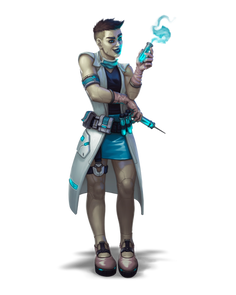Accessibility, Diversity & Inclusivity
- Arkelon Chronicles

- Apr 26, 2021
- 5 min read
We live in politically charged times. The discussion of personal identity and the way identity is represented in the media and culture is everywhere. We - as a Western society - are perhaps more open and progressive than we've ever been, and the push back against that attitude is also much more prominent.
Individuals from marginalized or underrepresented groups often feel as if they are actively fighting the status quo, pressing for equal inclusion of diverse ethnic, sexual, and gender identities in the media we consume. Sometimes the voices of those marginalized groups go unheard, as media heroes rarely stray from the traditional archetype. This is why we believe that diversity and inclusion in our game is vital. It may seem unnecessary to some, but truly, it has such a profound and critical effect on the development of our community.
We feel that with the growing popularity of tabletop roleplaying games, inclusion into the board game community is important as ever. Because we are a part of this vibrant community of gamers and have witnessed the shared enjoyment of this type of game, it is important to us to welcome new players, especially since tabletop gaming is a great way for friends to share fun and exciting moments together.
We, at Wendigo Workshop, thought it was important to make our game as inclusive as possible to share it with anyone who wants to play it, regardless of their heritage, preferences, or backgrounds. People on our team have ADHD, ASD, dyslexia, or other disabilities that may interfere with their ability to fully enjoy playing games for extended periods. This is also why we had at heart to make the gameplay as dynamic as possible, so everyone could remain entertained, and also why we wished to improve the readability of our rulebook with a dyslexia-friendly font. We also added sign language as something any character can learn, as we believe it improves the accessibility of roleplaying games for the Deaf and Hard of Hearing community.
We may have a lot of privilege in this society, and we don’t claim to speak for those that are marginalized by patriarchy or racism in the world. But as a mostly LBGTQA+ team, we think that there’s a pretty distinct lack of diversity in games, not only in gender and sexuality but in ethnicity and ableness as well. We hope that when people see our game they see a lot of characters that are like themselves, no matter who they are. And our main goal is to ensure everyone has the freedom to become whoever they want.
The TTRPG flag has long been one waved by individuals who feel like they don't quite fit in; the nerds, the geeks, the bookworms - but its open world and encouragement of imagination also extends to people of color, queer communities, and people dealing with disabilities.
It’s important that when people see characters introduced on social media that those characters are also introduced with their pronouns, helping to normalize that kind of introduction. When you’re reading the rules of the game, you will see gay characters, non-binary characters, disabled characters, and characters with a wide variety of skin colors and body types. Because representation is so important nowadays and can make a huge difference in someone’s life and perception of themselves.
Another one of our goals was to make the game accessible to adults as well as children, so anyone from any age can enjoy and share those magic moments. For a young kid questioning their identity, or even an adult still struggling with who they are and how they fit in, it can be hugely affirming to see those possibilities included in the game and to see strong characters that don’t necessarily fit the usual gender roles or other typical archetypes. It can also just be someone who wants to go through an awesome adventure with their friends!
We want to give people, especially our younger players who may not have come out yet, a safe place to quietly explore that part of themselves. For queer people, it’s extremely validating and welcoming to see players that look and feel like them in fiction, and this extends to stories we tell around a table (or online) with our friends.
Including representation costs nothing, but could mean everything to the people searching for themselves on those pages. But what it does take is time, and effort, and the ability to step outside of oneself; employ empathy, and attempt to view the world through a lens other than one's own. To walk a mile in someone else's shoes.
What is great about board games is that more than any other, this hobby of ours is a form of media that is all about connecting. It is about sitting down around a table with people that we call friends, and whom we love exactly as they are, and spending time enjoying each other's company (while also competing for absolute superiority, of course). It makes sense to want everyone at the table to feel represented; to feel valued; to feel seen.
"You have a place in this world," is what we want people to hear, to read between the lines. "You can exist here, too."
These are some steps in the right direction, and we are hopeful there will be many, many more.
If you are gaming with a disability – no matter what it is – don’t hesitate to let fellow players know about it. People are far more considerate and understanding when they know you’re not just being slow, difficult, or inattentive. Some disabilities are more obvious than others – it’s hard to hide the fact that you have a cane, guide dog, wheelchair, or crutches, but it’s hard to spot someone who is dyslexic, color-blind, or has some mild muscle condition that may not require assistive technology to correct, but still requires adaptation.
Also, quick TL;DR: talk about boundaries before you start a campaign with new people, and establish a method for dealing with crossed boundaries.
A positive experience relies on informed consent just as much as it does on any other social interaction. Because roleplaying games rely on improvisation, it is impossible to be completely transparent and so. It is difficult to consent to a situation where one cannot necessarily control the outcome.
There is no absolute fix for this. Yet if you know something is going to be addressed in your game, let people know - especially if it is a game involving sensitive subjects. That helps people, as players, decide whether they want to play on those themes. Tell them what you know about the scenario and allow them to leave before the game starts.
Also, this may seem obvious to some but let’s remind everyone that anyone can leave the game at any time for any reason. It means more than just telling players that; it means that everyone should contribute to an environment where they feel comfortable leaving. It means not socially pressuring others to play or stay in a game they don’t want to stay in, even if that means the game won’t run. It means not bad-mouthing those who leave. It means trying to diffuse the attitude that the best hardcore players stick around for that waterboarding scene.
A game is never more important than their well-being and that it’s not a big deal to stop play, because it’s relatively easy to regain immersion.
In conclusion, we want to make sure everyone feels welcome. You may not be a part of the POC community, the queer community, or suffer from any disability, but you’re welcome. By making this game more diverse, inclusive, and more accessible we do not wish to reject anyone. Our goal is simple; make sure everyone around the table is having a good time. Regardless of who they are.


























Comments